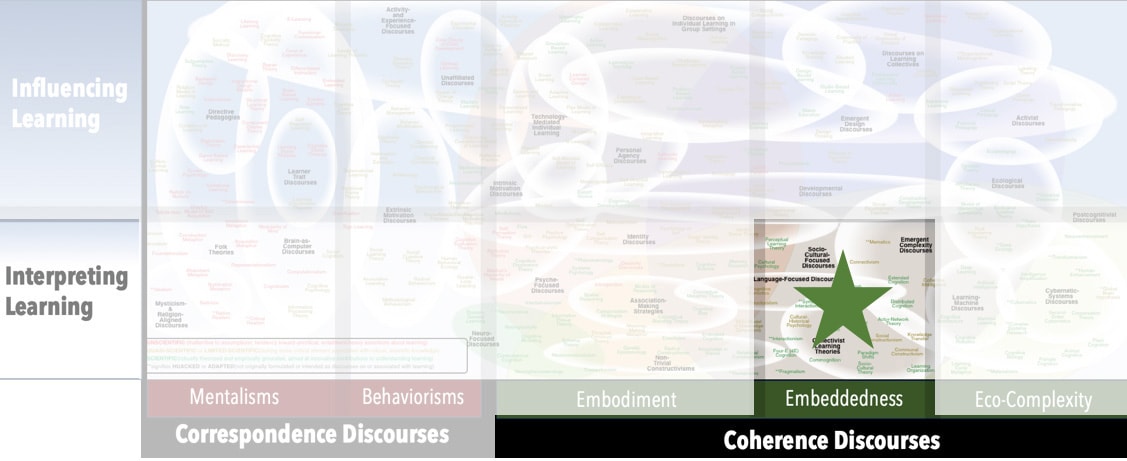AKA
4E Cognition
Four-E Cognition
Extended Mind
Focus
Agents incorporating physical and social worlds in extended cognitive systemsPrincipal Metaphors
- Knowledge is … scope of possible actions and interpretations
- Knowing is … embodied and situated doing
- Learner is … an individual (who doesn’t end at the skin)
- Learning is … creating; bringing forth (to meet to demands of a situation)
- Teaching is … N/A (but, when it happens: coupled participation)
Originated
1990sSynopsis
In Extended Cognition, mental processes are seen in terms of “four E’s”: embodied (i.e., involving more than the brain), enacted (i.e., inseparable from doing), embedded (i.e., coupled to a context), and extended (i.e., incorporating parts of the agent’s environment). Extended Cognition thus asserts that, to understand mind, one must look within and across the dynamic interactions of the brain, body, social environments, and physical environments. Similar discourses include:- Embodied, Situated, and Distributed Cognition (ESDC) (Benoit Hardy-Vallée, Nicolas Payette, 2000s) – a blend of Embodied Cognition, Situated Cognition, and Distributed Cognition. Originally, ESDC was put forward as advice to consider all three discourses simultaneously, but it is currently often invoked as a unified discourse.
- Wild Cognition (Louise Barrett, 2020s) – an equating of “cognition” and “life” – that is, the perspective that self-reference, self-maintenance, and other processes studied within Emergent Complexity Discourses are properly understood as the dynamics of cognition
Commentary
Extended Cognition is a variety of Distributed Cognition that does not appear to offer any significant elaborations.Authors and/or Prominent Influences
Mark Rowlands; Albert Newen; Leon De Bruin; Shaun GallagherStatus as a Theory of Learning
Extended Cognition is a theory of learning.Status as a Theory of Teaching
Extended Cognition does not wander into advice for teachers.Status as a Scientific Theory
On its own, Extended Cognition does not appear to have a much empirical support. However, recognized as a version of Distributed Cognition, it does have a significant evidence base.Subdiscourses:
- Embodied, Situated, and Distributed Cognition (ESDC)
- Wild Cognition
Map Location

Please cite this article as:
Davis, B., & Francis, K. (2023). “Extended Cognition” in Discourses on Learning in Education. https://learningdiscourses.com.
⇦ Back to Map
⇦ Back to List
